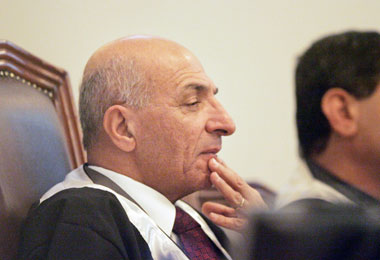|
Saddam trial resumes in Baghdad
(Reuters)
Updated: 2006-03-12 21:08
BAGHDAD - Saddam Hussein's trial resumed on Sunday with a fellow defendant
taking the stand to deny any involvement in the killing of 148 Shi'ites in the
1980s.
Ahead of the trial, a series of mortar blasts and roadside
bombings rocked Baghdad, killing 10 people. Similar violence has greeted
previous resumptions of the trial, which began in October. The court last sat on
March 1.

Chief judge Raouf
Abdel Rahman listens to the testimony of Ali Daeem Ali, a former Baath
party official in the Dujail region, during his trial as co-defendant of
former Iraqi president Saddam Hussein in Baghdad March 12, 2006. The trial
of Saddam resumed on Sunday as a series of bomb blasts rocked the capital
killing at least 10 people.
[Reuters] | Former Iraqi leader Saddam was not in court as he waited his
turn to testify. Saddam and seven others are charged with crimes against
humanity in connection with the killings of 148 men from Dujail after an attempt
on his life in the mainly Shi'ite town in 1982.
Mizhir Abdullah Kathim
Ruwaid, a former low-level official of Saddam's Baath party employed in Dujail's
postal department, denied being involved in the alleged crime.
He
distanced himself from a statement he signed in the presence of investigating
judge Raed Jouhi which said he had received orders from Saddam's half-brother
and intelligence chief, Barzan al-Tikriti, to arrest the men.
"I didn't
say that. I might as well have been signing a blank paper because I didn't have
my glasses when Judge Jouhi met me," he testified.
Appearing nervous and
wearing an Arab headdress, he repeatedly swore in God's name as he insisted he
was innocent of the charges.
The prosecution presented a letter in the
last session purportedly signed by Ruwaid and addressed to the interior minister
at the time. It included the names of some of the Shi'ites who were killed.
MINOR ROLES
Ruwaid and three other minor Baath
party officials, including his father, are only implicated in the Dujail
killings, unlike Saddam who still faces trial in other cases.
After
Ruwaid spoke for over an hour, Ali Dayi Ali, took the stand to begin his
defence.
Later in the trial, the prosecution will be able to bring more
evidence if it wishes and defendants will have a further chance to make their
case.
Each defendant will get the opportunity to rebut the charges
against them in the next few days and will not appear in court until it is their
turn to testify. It was not clear when Saddam was scheduled to appear.
Hearings are expected to last several days this week followed by a
probable adjournment of several weeks for the court to prepare more specific
charge sheets.
All defence lawyers were present at Sunday's hearing,
including former U.S. attorney general Ramsey Clark, who said last week that
hanging Saddam would only deepen sectarian tensions between minority Sunnis and
majority Shi'ites in Iraq.
In the last session on March 1, Saddam
acknowledged ordering trials that led to executions of the 148 and razing farms
around Dujail. But he insisted he had acted within the law as Iraq's president.
His statement, described by one U.S. official as a "damning" admission,
came after the prosecution produced what it said was a "death warrant" signed by
Saddam that condemned the Shi'ite men to hanging.
|